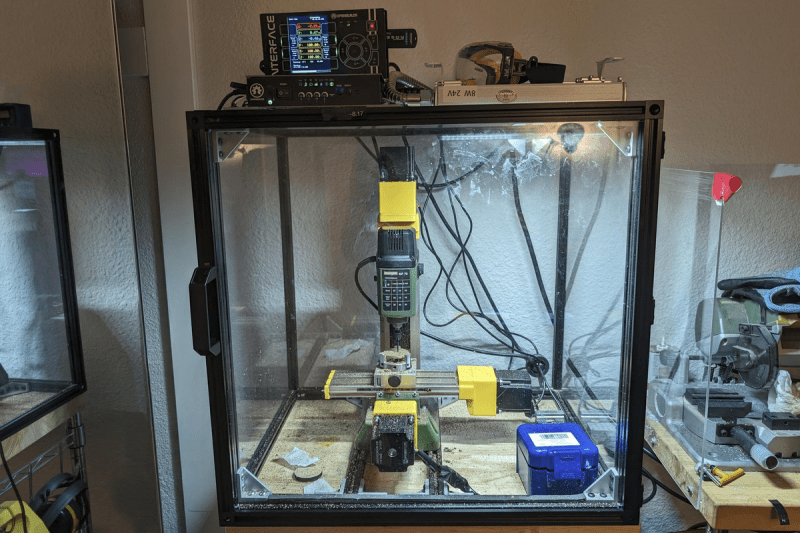The Proxxon MF70 mini-mill is a cheap and cheerful, but decently made little desktop mill. As such, it’s been the target of innumerable CNC-ification projects, including an official kit from the manufacturer. But that didn’t stop [Dheera Venkatraman] from sharing his Big Yellow take on this venerable pursuit with us!
This isn’t simply a CNC modification, it’s a wholly 3D-printed CNC modification, which means that you don’t already need a mill to make the usual aluminum pieces to upgrade your mill. And perhaps the standout feature: [Dheera]’s mod basically doubles the Y-axis travel and adds an extra 15 mm of headroom to the Z. If you wanted to stop here, you would have a bigger small manual mill, but as long as you’re at it, you should probably bolt on the steppers and go CNC. It’s your call, because both models are included.
[Dheera] also built a nice enclosure for the MF70, which makes sense because it’s small enough that it could fit on your desktop, and you don’t want it flinging brass chips all over your bench. But as long as it’s on your desk, why not consider a soundproof enclosure for the MF70? Or take the next step, make a nice wooden box, mount a monitor in it, and take the MF70 entirely portable, like this gonzo hack from way back in 2012.
















Never understood Proxxon tools. Why buy plastic equipment at twice the price of cast iron?
The MF70 is made (mostly) out of aluminum, and you can buy it for less then USD500. So, if you can find a (New!) cast iron machine for less then USD 250, then I’m sure lots of people will be interested. You may be able to find something much better for a lower price second hand. But small machines fetch higher second hand prices then bigger machines. Bigger mills often sell second hand for scrap value, because not many people have room for a 2000kg mill in their garage.
I guess a machine like the MF70 is mostly attractive to hobbyists who make very small things such as jewelry or models. And this is not a very stiff machine, but adequate if all your tools are less then 3mm. (Which also implies slow machining anyway).
The minimum which I would consider a “decent” machine would be a Sieg SX2 with a BLDC motor, but that is around twice the price of an MF70.
There is an machine made out of square aluminum extrusions. It’s a bit cheaper then the MF70, and you can bolt it together in different configurations (mill, lathe, maybe drillpress or fantasy construction for special cases). I guess quality would be somewhat comparable with the MF70, except maybe for the motor. I don’t know what sort of motor is in that thing. If need arises, you can replace it with the quite common 500W BLDC spindle. Inclusive power supply this costs around EUR120.
But if you want something good… Everything below around EUR3000 are machines with heavy compromises on both work area, stiffness and motor power.
what’s the name of that machine you mention made out of square aluminium extrusions?
I assume they are referring to one of the OpenBuilds machines like the C-Beam or Mini Mill: https://openbuildspartstore.com/openbuilds-c-beam-machine/
I never saw the point of these tiny mills unless you absolutely specialize in tiny work only, because their work travel is simply far too restricted even vs. a very much comparable Chinese desktop mini-CNC with a much larger table, at a possibly even cheaper price. On the other hand, a few years back we bought a brand new Opti BF20L (still a small but “serious” mill) with a manufacturer-supplied CNC conversion kit, and it came in at below 3000 Eur, new. Its only problem was that the spindle wasn’t meant for 10K RPM action, but we could still cut plastics and such too, just more slowly…
Proxxon makes budget tools, but they are very good. I’ll take Proxxon over anything Dremel, which I used before switching to P, which are also expensive, and failed me multiple times.
The MF70 is not plastic – it’s cast aluminium and very solidly & precisely built for what it is.
In good fettle it can do micron precision, it’s very much a machine for the watchmakers and other model-makers and the like, mine was CNC cutting keys to order in its previous life.
Comparing it to more “industrial” or even hobby machines designed for hogging out big lumps of metal is missing the point, the same goes for almost everything Proxxon make.
Just checked – the main casting is in fact cast iron, the table is extruded aluminium. They’re very robust little machines.
I also converted my MF70. As long as you go very slowly, it works very well. No backlash, very accurate.
However, as soon as you try to push the speed, the nylon nut inside the the table starts to smoke.
Nice. My first venture into CNC was a home-converted MF70 and I did something similar-ish to extend the very limiting Y-axis, but I milled aluminium parts on the MF70 rather than 3D printing. It really is a nice bit of kit if you only need to do small stuff.
https://0xfred.wordpress.com/2012/04/17/extending-the-mf70s-y-axis/